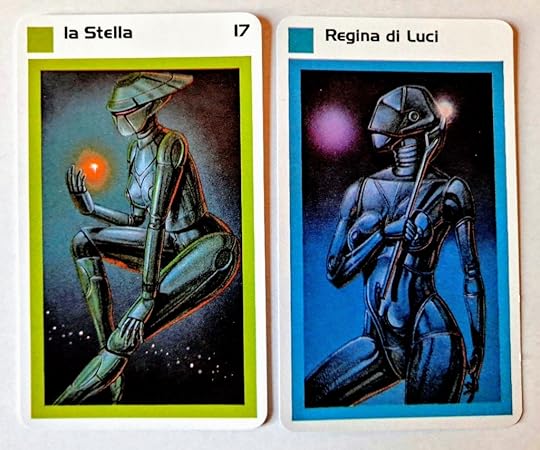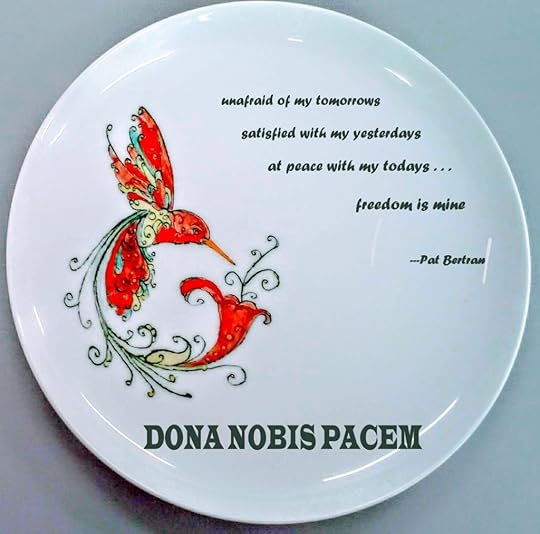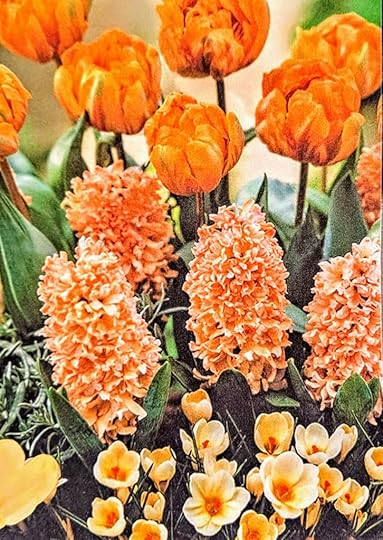Pat Bertram's Blog, page 48
September 16, 2021
An Itch to Write
I can feel an itch to write coming on — not just to do my daily blogging stint, or to write about grief, but to immerse myself in a story.
I’m not there yet. Too many things are calling for my attention to allow me to let “real life” take a back seat to a fictional life. “Real life” is in quotation marks because no one knows to what extent this life is real. It might be just a figment of our collective imaginations, a fiction that we create together. At least that’s what both the quantum physicists and the tarot seem to preach.
In my tarot readings this month, I’ve been getting the moon card rather frequently. The moon stands for imagination as a force. It also warns against the pitfalls of believing too much in what we perceive as reality, because what we observe can only reflect what is real the way that the moon reflects the light of the sun. This card might be echoing my interest in writing, or it might be that the card is creating that interest in me. It’s hard to tell with the tarot. Either way, it does seem to indicate a time of illusion.
Not that any of this has to do with writing specifically. It’s just that when I am focused on the outward life I see, I cannot focus on the inner life I might perceive.
As time goes on, my focus will change. As the hardscape of my yard becomes more fixed and my gardens become more viable, I will have a lot more free time (mental free time, that is), especially in the winter. My job will be coming to an end at some point. I originally agreed to a year and then contracted for another six months, but as I get even older, I’m not sure if anyone will trust me with their elders. My senzaburu (1000 origami cranes) will be done by the end of the year. And the hidden object game I have been fascinated by for the past year is becoming less fascinating now that I’ve opened all the locations. There is a new location every month, which revs up my interest, but even that might not be enough to overcome my creeping boredom with the game.
As my current areas of focus gradually become blurred, that’s when one of the stories rattling around in my brain will take root.
I’ll be interested in seeing which idea plants itself. (If you have a preference for any of these story ideas let me know.)
1) A sequel to Bob, The Right Hand of God, perhaps? If you end up with two characters named Adam and Eve, it seems almost an obligation to write their story. 2) A sequel to Madame ZeeZee’s Nightmare? After all, the main character (me!) is alive and well in Colorado, and seems to be calling out for a new episode in her fictional (and oh so murderous) life. 3) A ghost story? The only ghost I ever created is a ghost cat in Light Bringer, so it might be interesting to bring a different sort of ghost to life. It’s possible 2 and 3 could be the same story. 4) A novel of psychological terror where the poor protagonist isn’t sure if she is going crazy or if she is seeing ghosts? It’s possible 2, 3, and 4 could be the same story. 5) A story based on a tarot reading, with each twist and turn dictated by the cards? It’s possible 2, 3, 4, and 5 could all be the same story, a combination of any two or three or each could be a separate tale. 6) A completely different story, one that hasn’t made itself known to me yet.
All that is in the future. My current foci — my house, my yard, my job, the hidden object game, the tarot, the senazburu, my daily blog offering — are still with me.
But someday . . .

***

What if God decided S/He didn’t like how the world turned out, and turned it over to a development company from the planet Xerxes for re-creation? Would you survive? Could you survive?
A fun book for not-so-fun times
September 15, 2021
The Star and the Queen of Light
A couple of days ago, I mentioned how the two tarot cards I deal myself each day seem to relate more to each other than to me. Todays picks seem a particularly symbiotic pair — The Star and the Queen of Light.
This current deck is the i Tarocchi di Robot, one of the most fascinating of the decks in my collection. There is true irony is trying to delve deeper into the meaning of what it is to be fully human — which is what I understand is the purpose of the tarot — by using images of robots, the opposite of human (if anything can be considered an opposite).
The Star in this deck is about the experience of beauty, joy, fulfillment, finding inner harmony, to be centered and at peace. It’s also about hope, that light inside us that keeps us going even in the darkest times.
The Queen of Light in this deck correlates to the queen of pentacles in most decks. The suit of luci is about the light that creates rather than destroys, about the light that gives life. And that is typical of this queen because she is an earth mother type (since this is a robot deck, perhaps I should say she is a stellar mother type) filled with feminine creative energy, compassion, love, intuitive understanding, calm and balance.
Oddly, I glean the same message from these two cards as I did from the reading a couple of days ago: that my life is going well, and that I should continue to focus on creating a calm and balanced life for myself.

***

What if God decided S/He didn’t like how the world turned out, and turned it over to a development company from the planet Xerxes for re-creation? Would you survive? Could you survive?
A fun book for not-so-fun times.
September 14, 2021
Cheap Writing

I’m reading a book by an author I can generally tolerate despite his obviously manipulative style, but this particular book irritated me from the first page.
One of the characters is a teenager. And like almost all teenagers in adult books, this one is rebellious, insolent, arrogant, and downright nasty. And those are her good qualities. Well, her only qualities.
Since this author is so manipulative, it’s possible he chose the character as one who would be, with only a few strokes of his keyboard, instantly recognizable to his readership, but if so, why? Why do so many teenagers in books have to be like this? The character has ruined more stories for me than even the serial killers who so lovingly demonstrate every single cut and cherish every single drop of blood. It’s as if no one will believe that a teenager can be other than appalling, especially since the parent’s inability to deal with the inexcusable behavior often serves as a subplot. If the teenager is as nice as many I have met (and as placid as I once was), then bang, there goes that subplot, and the author would have to think of another one.
It’s also a cheap subplot (sometimes even the entire plot) because the more terrible you make the teenager, the more obvious the character arc when the kid grows up. Whatever happened to subltety?
I suppose, since this author tends to play with such archetypes rather than breathing life into a creature of his own, it makes sense he’d build a story on such a flimsy pretext. Unfortunately, as bad as things are at the beginning of the book, things promise to get a whole lot worse by the end. Assuming, of course, I stay to the end. I might consign the kid to the fires of unreadable books long before it gets to that point.
What I would really like to see is the opposite (and occasionally, an author does present such a change) where the parent is rebellious (without being abusive) and the teenager has to deal with the moodiness. Or even better — no teenagers at all.
I used to read young adult books way into my adulthood because I enjoyed the theme of a misfit standing up to the world and its conventions, finding a fit, and becoming their own person, but I seldom come across such a storyline any more. (That also used to be plot of the Regency romances I read in my youth — the main character was always a societal misfit who ended up finding a fit. But that storyline has been suffocated under the current fad for stories that skirt the edges of porn.)
Obviously, I can’t do anything about books with horrid teenagers except not read them, and if I had time to go to the library, or if I had other book to read, I wouldn’t give this one another minute of my time.
What I can do, though, is eschew such cheapness and triteness in my own writing.
And yes, I will write another novel one day.
Perhaps.
***

Pat Bertram is the author of Grief: The Inside Story – A Guide to Surviving the Loss of a Loved One. “Grief: The Inside Story is perfect and that is not hyperbole! It is exactly what folk who are grieving need to read.” –Leesa Healy, RN, GDAS GDAT, Emotional/Mental Health Therapist & Educator
September 13, 2021
More Tarot
I am continuing with my tarot studies — to the extent that doing a daily two-card reading can be considered studies — and even after more than a year, I’m not sure what to make of the cards. Although most cards do seem to resemble my life in some way, it’s the same sort of vague way that a newspaper horoscope represents one’s life. I am not learning anything about my life that I didn’t already know, and in fact, it’s my knowledge of my life that brings sense to the cards rather than the cards bringing sense to my life.
Now that I have progressed to a two-card layout (the first year was a daily one-card pick), I am noticing that even though the cards don’t seem to relate all that much to my life, they do seem to relate to each other.
For example, the other day, the cards I dealt out were the Empress and the Queen of Pentacles. As always, the question I ask is “What do I need to know today?” The first card represents my situation, the second the challenge I face.
Some readers interpret the Empress as the female principle the positive female attributes of creativity, love, abundance, intuition, nurturing, finding balance in our lives, connecting to the world through our senses. An earth mother archetype who loves beauty.
And some readers interpret the Queen of Pentacles as nurturing, filled with feminine creative energy, compassionate, hard-working, loving, intuitive. An earth mother archetype who enjoys the comforts and luxuries of life.
Such a correlation between the two cards! And a correlation between the cards and me too, I suppose, though these cards might be said to represent any woman. What I gathered from the cards is that my life is going well, and that I should continue to focus on creating a calm and balanced life for myself.
Since that’s what I am doing anyway, this personal interpretation might have nothing to do with the cards and everything to do with my own inclination. Which leads to another possibility — instead of me reading the cards, perhaps the cards are reading me.

***

What if God decided S/He didn’t like how the world turned out, and turned it over to a development company from the planet Xerxes for re-creation? Would you survive? Could you survive?
A fun book for not-so-fun times.
September 12, 2021
Grief and Peace
Studies have indicated that happiness is found mainly in retrospect. For example, happy children don’t know they are happy. They simply are happy. It’s only later, when they look back, perhaps after a terrible time in their adult lives, that they realize they had been happy in their early years. For another example, when someone is involved in a challenging situation that takes all their time and energy, they don’t realize until later they were happy. In fact, often while going through this “happy” situation, people think they are decidedly unhappy.
It happens with grief, too. Sometimes a couple isn’t particularly happy, but after one of the partners is deceased, the remaining person looks back and realizes that, despite the disagreements and difficulties, they really had been happy. Or after caring for a loved one during a long illness, the void they leave behind makes those painful days of being with the loved one seem akin to happiness.
Happiness might also be found in anticipation, in hopes for a time when joy might come again. Oftentimes, when someone has gone through a difficult time, they find it easy to look ahead to future happiness, but not when that difficult time is grief for a loved one, and especially not when the loved one is a spouse or soul mate.
The chaos of grief is so great, the blackness so opaque, the pain so all-consuming, that we cannot look to the future as a rosier time. How could there be happiness again when the person we loved more than anything, when the person whose very presence brought us happiness is dead? Chances are there will be happiness again. We change, our perspective changes, our focus changes, so the pain and yearning that once filled our being gradually shrinks into the essence of our souls. We still feel the loss, but like with bark that has broken to allow a tree to grow beyond its confines, our hearts and souls break and then expand to allow other feelings to exist alongside the pain.
Although I often offer a promise of future peace to grievers who show me their pain, I never promise happiness. In fact, I seldom mention the possibility because it’s no consolation. For a long time, the very idea of finding happiness without our deceased mate seems too much of a betrayal of our shared life.
But peace is attainable. Even in the days when the yearning for one more smile or one more word feels as if it will explode out of us, we can find brief moments of peace when the chaos is temporarily stilled, when the roar of pain and loss is temporarily silenced. As time goes on, these moments happen more frequently, and as even more time goes on, the duration of these moments is extended, until one day the peace begins to linger longer than the chaos.
When grievers call out to me in their pain, I want what any caring person wants — to ease their pain. But I, more than most, know that their grief belongs to them. It’s not up to me to take it away from them or even to add to the pain by “bleeding” for them, as people used to tell me they did. (Did they really think it eased my pain to have them bleed for me? That I bared my pain as plea for someone to take the burden of loss from me? If so, they were wrong. Baring my pain was a gift, to show other grievers that they are not the only ones who feel the pain and chaos of grief, that no matter how insane those feeling seemed, they were a normal reaction to an abnormal situation.)
All I can do is offer grievers a place to voice their pain and to send them a wish for (and a belief in) the possibility of peace.
So today, whether you are struggling with grief or trauma, or feelings of unworthiness and guilt for whatever happiness has come your way, I wish you peace.

***

Pat Bertram is the author of Grief: The Inside Story – A Guide to Surviving the Loss of a Loved One. “Grief: The Inside Story is perfect and that is not hyperbole! It is exactly what folk who are grieving need to read.” –Leesa Healy, RN, GDAS GDAT, Emotional/Mental Health Therapist & Educator
September 11, 2021
A Virus by Any Other Name
In the following scene from A Spark of Heavenly Fire, my novel about a novel disease that was first published in 2009, investigative reporter Greg and his editor Olaf are talking about an article on the pandemic Greg is hoping to write.
—-
“How’s the research coming, Greg?” Olaf asked, a shade too heartily.
“I feel as if I’m drowning in paper.”
“So I see,” Olaf said, laying a hand on the stack of articles. “Mind if I look?”
“Help yourself. They belong to the newspaper.”
Olaf settled himself in his customary chair with a handful of the papers. A minute later, he raised his head.
“How do these guys get anything printed? If my reporters turned in work as incomprehensible as this, they’d be out of here so fast they’d think they were flying.” He glanced at the papers and shook his head. “Even the titles are incomprehensible. ‘Imitating Organic Morphology in Micro-fabrication.’ I don’t even know what that means.”
“Me neither,” Greg said, thinking if he had to wade through this sort of stuff to learn about the red death, the earth would fall into the sun long before he read half of it.
Olaf tossed the sheaf of papers back onto Greg’s desk. “Better you than me.”
“What do these guys do?” Greg asked. “Take a course in obfuscation?”
“Probably. Convoluted writing and obscure terms are a way of intimidating the uninitiated, keeping the profession closed to non-scientists, and adding to the scientific mystique. Just think, if diseases had names like Bob and Carol and Ted and Alice, doctors wouldn’t make anywhere near the amount of money they do now.”
Greg laughed. “That’s an idea. They do it for hurricanes, why not everything else?” He mimed seizing the phone and dialing. “Mr. Olaf? I can’t come in today. I’ve got the Bob.” He hung up his imaginary receiver and looked inquiringly at his boss.
Olaf nodded. “Works for me.”
—–
And it works for me.
By the time this new virus was well-publicized, I was already sick of the fear mongering. For example, one of the first studies of the possible effects of this pandemic claimed that 80% of the world’s population would die. It was that first insane projection from which all the other insanity came.
The truth is, most people did not get infected, and of those infected, most did not get sick, and of those who got sick, most did not die.
Again, as with my post yesterday, I am not trying to denigrate anyone’s experience. For those who suffered deaths in the family, severe illness, isolation from family, or financial hardships, it was a terrible thing. But for most of us, the worst was the fear. It was reprehensible the way people who should have known better — the political hacks representing us, the media, the idiotic folks who put sick people into nursing homes where so many elderly lived — exaggerated the truth and caused immense (and in many cases, unnecessary) fear. There is a good chance we would not have been that much worse off if we had all just gone about our business, but too much jockeying for position was being done by people in power or people who wanted power, and truthfully, I think their tactics were so successful that they ended up buying into their own propaganda of fear.
And the manipulation is still going on. A vaccine of sorts is available for those want it, but the next move is to make the vaccine mandatory to “protect the vaccinated.” Huh? I thought the purpose of the vaccination itself was to protect the vaccinated. And if the vaccine isn’t a real vaccine, one that does protect the recipient, when are they going to get a real vaccine so that those who want to be fully protected can be? As with everything else that has gone on the past two years, the truth is hard to come by. What we are told might be the true truth, a semblance of the truth, or a wholly manufactured truth.
To keep from validating any of the shenanigans that is going on surrounding this virus, I have refused — and continue to refuse — to use any of the official names the parasite is given. Hence, “The Bob.” My own private rebellion.
I mean no insult to any Bob living or dead, of course. I named the disease many years ago back when I didn’t know any Bobs, and reusing the name for this virus seemed a good way to keep myself from succumbing to the fear and intimidation that the media and our so-called leaders apparently want us to feel.

September 10, 2021
Living In Fear

Almost all new books mention, in some way, “The Bob.” Of course, the authors don’t know enough to call it “The Bob,” so they call the virus by other names that don’t really mean much. It was bad enough living through the upheaval; it’s a whole lot worse having to relive it in books. Sometimes, the reference is simply a placeholder, to give people an idea of when the story takes place, which is never a good idea because it dates the book, and readers in the next few years who prefer only current books won’t be interested. Other times The Bob is a major plot point. Either way, it doesn’t interest me. It seems perhaps sacrilegious to say this, considering the trauma so many people suffered during the past year and a half, but whether The Bob is mentioned merely to set the time or is an intricate part of the plot, it seems . . . trite. And even worse than trite — a cheap shot to get people personally involved in the story instead of using good writing to get engage readers.
I could be wrong, of course. Others might like to see their “Bob” experiences from a different point of view, to gain a bit of perspective.
The author of the book I am currently reading talks about how worn down people are from more than a year of worrying about their families and themselves; how weary they are of having to wear masks and keep their distance from others; how exhausted they are from isolation and loneliness and grief; and especially, how tired they are of living in fear.
I do understand that many people got deathly sick, that loved ones died, that some people suffered tremendously from isolation, but those things alone, I would think, would preclude people from reading about the horrors they lived through.
Notice I say, “the horrors they lived through.” Despite what I wrote in the first paragraph, that it was “bad enough living through the upheaval,” the truth is, for me, it wasn’t bad at all. In fact, it made no difference to my life. Well, except for the mask, but since I was seldom around people and seldom went into a store, I rarely had to wear it.
I never worried about myself, never was afraid, never was lonely (except for a few times that had nothing to do with The Bob). Most of the people I cared about were already dead, and those still alive were taking care of themselves. I didn’t have any travel plans to call off, and as for local events, I’d mostly stopped going to those before they got cancelled. (I’d gained too much weight for one thing; the food was generally something I shouldn’t eat, for another.)
So I stayed home and read. I did see a few people, but always the same ones — the woman I worked for as well as an occasional friend or two. And that is exactly the life I would have lived even if The Bob had never made itself known.
I’m not denigrating anyone’s experience. I know it was a rough time for a lot of people, but it does seem strange to me that in this, as in so much else, what might be good for one person is terrible for another. Still, we each have our own nemeses.
I don’t know if it’s true, but I read that women with O positive blood got The Bob less frequently and not as bad as people with other blood types (it has to do with the protein coating on the cells). Unfortunately, it is definitely true that women with O positive blood are especially tasty to mosquitoes that carry various deadly viruses.
It just goes to show, if one thing doesn’t get us, something else will, though with the mosquitoes as with The Bob, I do the best I can. I won’t live in fear.
***

What if God decided S/He didn’t like how the world turned out, and turned it over to a development company from the planet Xerxes for re-creation? Would you survive? Could you survive?
A fun book for not-so-fun times.
September 9, 2021
To Buy or Not to Buy
The last two times Arbor Day Foundation sent me a gift to thank me for my donation (though really, it’s not so much as a donation as payment for the gift), the plants and bulbs were worthless. The plants were too tiny to plant, though in retrospect, I should have put them in a pot and babied them, but considering that I didn’t remember ordering them and didn’t even know what they were, it didn’t really matter what I did with them. The bulbs I got at the beginning of summer were a disappointment. Only one gladiolus bloomed, and I’m afraid if I dig up the bulbs like they suggest and replant them next year, the same thing will happen, so I’m going to cover them with some sort of mulch and leave them where they are. Maybe with an earlier start, they’d be okay.
Normally I’m not disappointed in the failure of Arbor Day Foundation “gifts” because I know how seldom they thrive, at least with me as their caretaker, but I was disappointed in the bulbs because the bulb collection they sent last year did well.
Because of the disappointment, I’d decided to toss away any further solicitations unread, but today, as I started to shred the card with my name on it, I noticed the most beautiful blooms. These are yellow, light orange, and apricot, and last year’s collection (the one that did well), was pink and purple.
I couldn’t do it. Couldn’t tear up the card, I mean. I know even if the bulbs bloom, they will never look like the photo, but even if one of the bulbs comes up, it will be a delight. So I’ve added this card to the stack of planting items to order this weekend when I have time to concentrate.
In my defense, I received a flower catalog yesterday, and though the gardens portrayed made me envious, I set aside the catalog and didn’t order from it, so perhaps my will power was all used up, and that’s why this gorgeous sunset-colored collection of bulbs got to me.
And the plants I’m not buying? Well, there is still plenty of time for me to change my mind, and if I remain steadfast and don’t change my mind, there’s always next year. So, it seems, when it comes to plants, bulbs, and seeds, my quandary is not “to buy or not to buy,” but “to buy now or to buy later.”

***

Pat Bertram is the author of Grief: The Inside Story – A Guide to Surviving the Loss of a Loved One. “Grief: The Inside Story is perfect and that is not hyperbole! It is exactly what folk who are grieving need to read.” –Leesa Healy, RN, GDAS GDAT, Emotional/Mental Health Therapist & Educator
September 8, 2021
A Focus for My Life
As I was wandering around my property, planning my next step in turning the yard into a micro park, my focus shifted, as it sometimes does, and suddenly it all seemed so foolish. I could only think, “Why am I doing this?”
I had no answer for my question because at that moment, it truly did seem silly to be doing all this planning and working, spending money on plants and seeds, and setting myself up for a huge summer water bill as well as months of work each year to keep up with the maintenance once the project is completed.
My focus eventually shifted away from the silliness of it all, though a bit of that feeling lingers. In a way, it really is silly, and yet, why not? It’s no sillier than the rest of my life. I write books that few people read. I read books that do nothing more than keep my mind occupied while time passes. I prepare meals that go in one end and come out the other. (And nothing, really, is sillier than that!)
If I had anything more profound to do than to turn my yard into a place of beauty (or rather, to try to do so since the results are, to a great extent, out of my control) I would probably be doing that instead. And yet, gardening — just the act of gardening itself — might be as profound as anything else. I’d say it was joining in the act of creation, but so much of gardening is as much destruction as it is about creation. For example, weeds are natural, a part of creation, but we gardeners take it upon ourselves to choose which plants live and which die. And all the rock I have around my house to protect the foundation came from the destruction of a mountain.
Perhaps with gardening and landscaping, I am just revving my internal engine, creating work for myself to no great end, but I don’t suppose it matters. It gets me outside, for one thing. Gives me a focus, for another.
It is good to have a focus, and even if that focus slips once in a while to reveal the foolishness of that focus, it’s still good. At least — in my case — it keeps my mind off the very real inanity of daily living. I mean, truly, what’s it all about? Going to bed. Dreaming. Getting up. Working and working out. Sweating. I could go on, but there’s no need to. You know what I’m talking about — all those dreary rites of maintenance that only serve to keep the body functional.
So see? It’s a good thing I have my various yard projects to focus on! I just need to occasionally remind myself of that.

***

What if God decided S/He didn’t like how the world turned out, and turned it over to a development company from the planet Xerxes for re-creation? Would you survive? Could you survive?
A fun book for not-so-fun times.
September 7, 2021
Mind over Matter
I’ve lived long enough that you’d think the workings of my own mind wouldn’t be much of a mystery anymore, but still, it does surprise me at times how hard it is to overcome the it-doesn’t-matter mindset.
For example, a week ago I noticed that it’s been a little more than a year since I last changed the batteries on my smoke alarms. It took three or four days before I made the leap from thinking about the job to actually setting out my box of batteries. It took another day to remove the batteries I needed from the box. It took yet another day to buy extra batteries, even though I had enough for this particular job.
Admittedly, a few of those procrastinating days I’d overdone it with gardening work, and I didn’t think it would be smart to climb a ladder under those conditions. In fact, I even considering asking the contractor or one of his workers to change the batteries for me, or at least to stand by while I did it. I simply couldn’t get my mind in the right place to do the work.
When I finally settled into carrying out the task, it didn’t take long at all, but I can certainly understand why I stalled. The new smoke alarms have a little drawer you can pull out (rather than having to pull the whole unit off the ceiling), which is supposed to make it easy, but nothing is easy when you have to work with your hands over your head. And of course, the little drawer is only plastic, so even when it is difficult to pull out, you can’t really force it otherwise there would be the truly onerous task of replacing the whole unit. And once the drawer is open, the batteries won’t come out easily. Yikes.
But the job is now completer, the box of batteries put away, and the ladder is back in the garage. I’d feel silly about how much mental work it took before I could do the physical job except that . . . well, I simply didn’t want to do it. And truly, it didn’t matter, and it wouldn’t matter until the alarm started chirping and forced me to do what I should have already done. It’s that thought of pending doom that finally got me up on the ladder.
Now I can stop thinking about having to do that particular job and set my mind to working on other things that don’t matter, like solving puzzles. Or I could work on solving the more important puzzle of how to do the mystery at the museum event. Luckily, for that job, I have you (and thanks for all your help!) as well as a friend who is coming up with some great ideas. But still, how much do you want to bet that I will wait until the last minute because I can’t make the mind over doesn’t-matter leap?

***

Pat Bertram is the author of Grief: The Inside Story – A Guide to Surviving the Loss of a Loved One. “Grief: The Inside Story is perfect and that is not hyperbole! It is exactly what folk who are grieving need to read.” –Leesa Healy, RN, GDAS GDAT, Emotional/Mental Health Therapist & Educator



